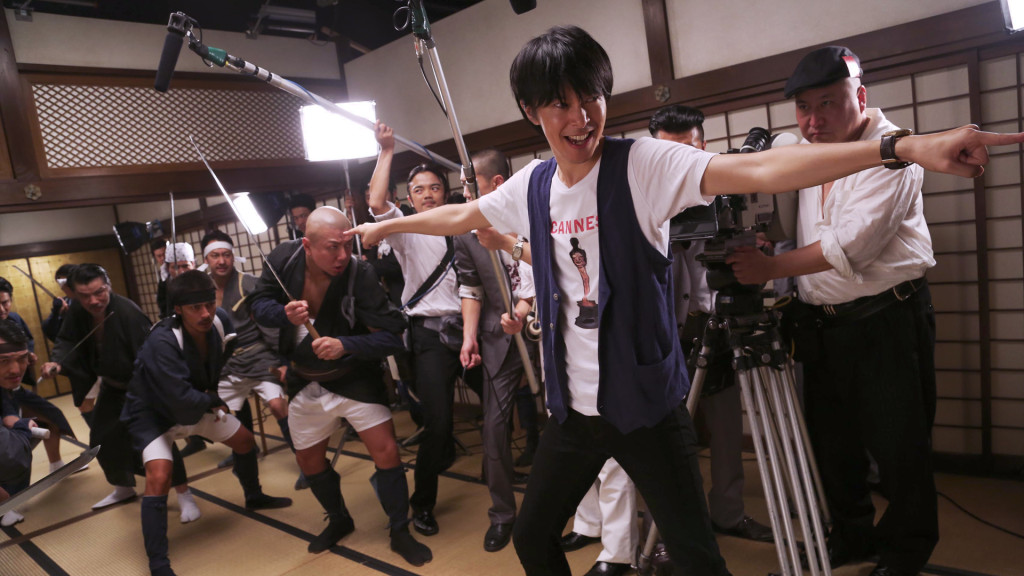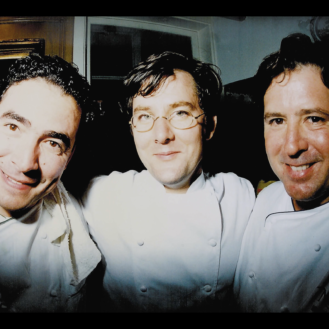By: Addison Wylie
Why Don’t You Play in Hell? features characters who are crazy about filmmaking. And, with cruel irony, Why Don’t You Play in Hell? made me want to abandon movies.
Have you ever been around a group of people who like something? I mean, REALLY like something. The wave of high-pitched enthusiasm is enough to make you suffocate. This unwatchable film takes that glee and warps it into a form of aggressive, painful monomania. So much so that you have the sudden urge to leave, and run far away. Which leads to my sad confession.
In all my years of watching movies, I consider this movie to be my first “walk out”. I’ve turned off movies before because I’ve been fatigued, or they’ve coincided with future plans, but I make sure I pick them back up. I hadn’t met a film that could trump my perseverance and belittle me to a snivelling pint-sized raisin. That is, until I locked eyes with Why Don’t You Play in Hell?.
It has taken me a couple of tries to get through this horrible movie. During my first viewing, I cringed through the first thirty minutes which contains a non-stop barrage of loud enthusiasm. Imagine every Tarantino rip-off bellowing through a megaphone. To say the performances were merely excited would be an understatement, and to state that the boundless actors cross a line into annoyance would be an even bigger one. Everyone shouts, everything explodes, and none of it is remotely original, interesting, or creative in any way. “Life is too short,” I figured as I turned my back.
But, damn it, I went back. Reader, I can’t quite explain why besides the notion that I didn’t want to feel like a movie had “beat me”. This movie was made for someone (other than the lowly, smug teenager it seemed to be pandering towards to) and I was going to find out who it was for.
As I muscled through the first thirty minutes and past the time leap in the movie, Why Don’t You Play in Hell? offered more of a substantial story apart from its superficial nerdy expressionism. It was still obnoxious, but it had settled down. Like a kid crashing from too much sugar.
The film was now set in modern day Japan, with those same characters having to deal with their current slumps. The central happy-go-lucky filmmakers hadn’t progressed and their lead actor was growing restless from having seen nothing materialize from their dreams. Meanwhile, central crooks were still grumbling over their own mobster politics. The audience meets too many characters with underdeveloped ties to each other, with the huge story building towards a climax where everybody wants to make a movie.
The film wants us to anticipate the bombastic climax, therefore movie goers will feel like they’re enduring one super-long, repetitive pre-show. When the finale is finally ready to present itself, we’re tuckered out from the frustrating, intolerable silliness of it all.
The film doesn’t exude hate, but I was offended by how it set out to deceive movie goers. Since the story is shallow, director/screenwriter Shion Sono uses the audience’s love for movies to manipulate them into thinking there’s more meat on the slender bones. He even goes as far to include an old sage who runs a 35mm projector, just so there’s a connection to the way cinema used to be.
So, who is this movie for exactly? I guess film geeks and aficionados, but that crowd is too smart to fall for such cheap trickery. It takes more than characters mentioning 35mm to gain a film expert’s acceptance. However, Why Don’t You Play in Hell? did win the Midnight Madness People’s Choice Award at TIFF in 2013. Then again, maybe oxygen runs thin in Toronto’s Ryerson Theatre after the witching hour.





Leave a comment